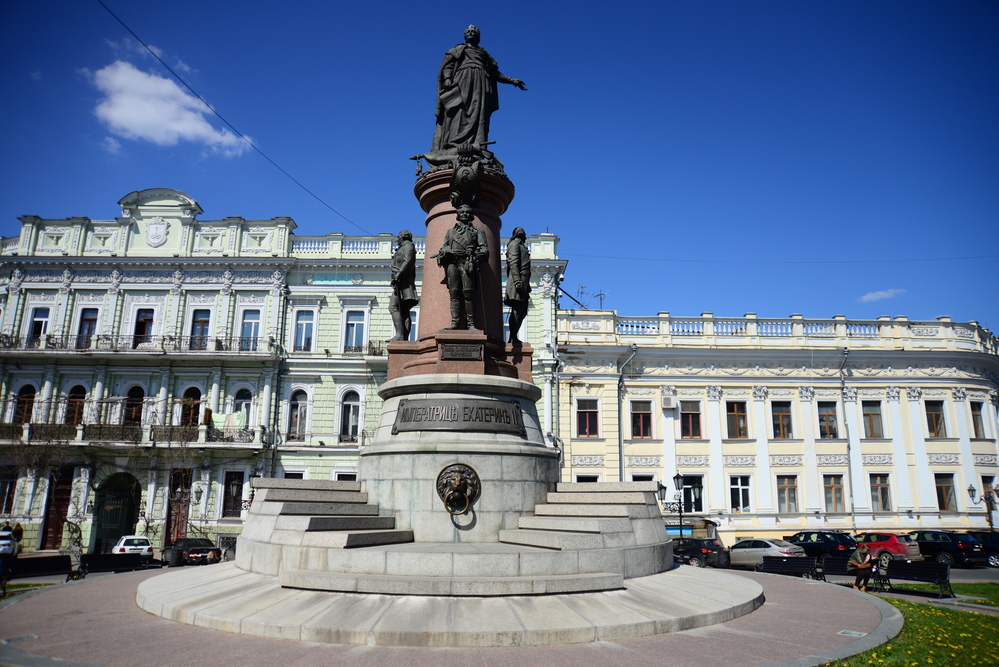Waiting to be inscribed on UNESCO World Heritage in Danger list, Odesa must urgently face its Russian imperial past and choose which monuments to protect and which to demolish. The monument to Russian Empress Catherine II, who divested ample funds into Odesa yet went down in history for destroying the remnants of Ukrainian statehood -- the Zaporizhzhia Sich -- in 1775, is at the center of controversy.
Inscription of Odesa on the UNESCO World Heritage List
In the south-Ukrainian city of Odesa, the preparation of a nomination dossier for the inclusion of the historical center of the city in the UNESCO World Heritage List and the List of World Heritage in Danger is completed. The port city with French roots and a multicultural heritage strived to be on the UNESCO World Heritage List for years.
During the Russian full-scale invasion of Ukraine, the international community recognized the status as critical to saving the city's cultural heritage from destruction.
On 30 August 2022, at a meeting with UNESCO Director-General Audrey Azoulay, Ukrainian Minister of Culture and Information Oleksandr Tkachenko announced that Ukraine would request the inscription of Odesa on UNESCO’s World Heritage List.
UNESCO mobilized an expert team to assist the city with the nomination dossier work so the World Heritage Committee can review it at the next UNESCO session. The Cabinet of Ministers of Ukraine and Mayors of Ukrainian cities, in particular the Mayor of Lviv, and a team of experts from Italy also participated in putting together the dossier.
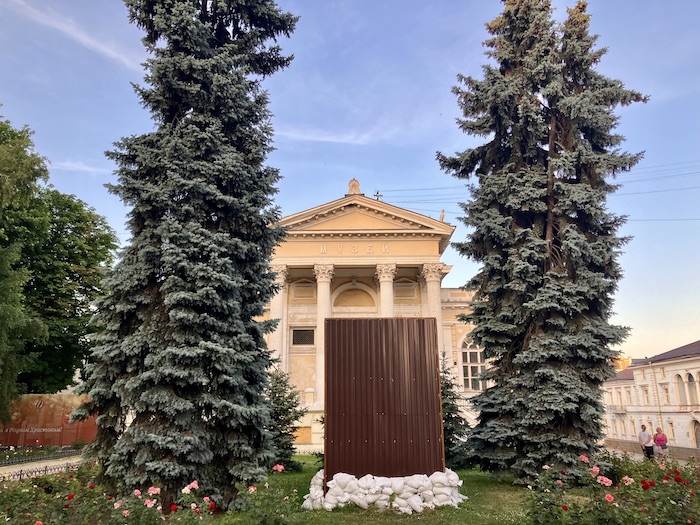
At the meeting at the Mayor’s office on 16 September 2022, the working committee reported on the completion of the technical stage of the process. The dossier will be submitted to the Ministry of Culture of Ukraine for approval and then the Mayor’s office team and the representatives of the Ministry of Culture and Minister of Foreign Affairs will forward it to UNESCO.
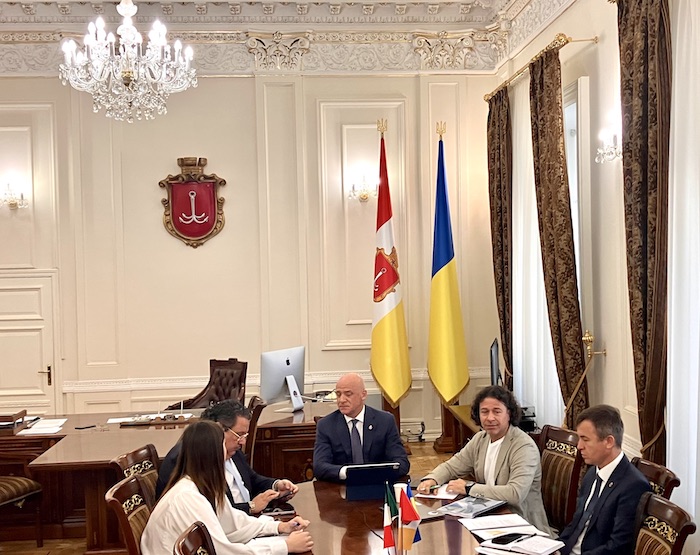
A number of high-ranking officials from UNESCO, Italy, and Ukraine spoke at the Zoom meeting in the City Hall. Ernesto Ottone, UNESCO Assistant Director-General for Culture, pointed out that UNESCO supports Ukraine and provides help to many causes in several Ukrainian cities.
Kyiv and Lviv historic centers are already on UNESCO’s World Heritage and might be added to the List of World Heritage in Danger. He said that Odesa can count on UNESCO to have all needed diligence to ensure that Odesa could be a part of the World Heritage list.
“The Russian Federation attacked both tangible and intangible cultural heritage of Ukraine. At least 169 churches, 45 libraries, 36 museums, and 250 or more important architectural buildings were destroyed. In total, 500 objects of cultural heritage are currently damaged or completely destroyed and this number increases with every single day,” said the Head of the National Commission of Ukraine for UNESCO Emine Dzhaparova.
According to her, the inclusion of the historical center of Odesa in the UNESCO World Heritage will become “a tool of courageous resistance.”
Making Russia answer for destroying cultural heritage in Ukraine
Deputy Minister of Culture and Information Policy of Ukraine Kateryna Chueva said that Ukraine hopes for the support of the member states of UNESCO.
“Inscribing Odesa on the World Heritage list is crucial for protecting the cultural heritage of Ukraine for the next generations,” she noted, adding that the bid package will be sent to UNESCO only after the additional expertise is performed in accordance with the Ukrainian legislation to ensure that “the imperial past of Ukraine is marked in an appropriate way.”
“Today, we are witnessing Ukrainian cities being barbarously destroyed, with all living beings killed by the Russian army,” said the Mayor of Odesa, Mr. Trukhanov, speaking to Euromaidan Press after the meeting.
“Odesa has a great cultural heritage. Today, there is a real danger of it being destroyed. We already have some evidence: after the rocket hit our city, the Vorontsov Palace, an important architectural monument, was damaged by its fragments and the shock wave. […] Of course, inclusion the city in the UNESCO heritage list is not an air defense system or weapons, yet, it is the protection by the entire civilized world from barbarians.”
“This unprovoked war started by the Russian Federation is targeting our cultural heritage. They insist that Ukrainians don't exist as a nation. They said they would conquer Odesa even if they [had to] kill all the residents.
That's why I think that including the Ukrainian city Odesa in UNESCO [World Heritage list] is our battle for existence. And we are not alone on the battlefield. All of you have contributed to our victory. The whole world sees and appreciates it," said Mykola Viknyansky, advisor to the Mayor.
What would a new status mean to Odesa?
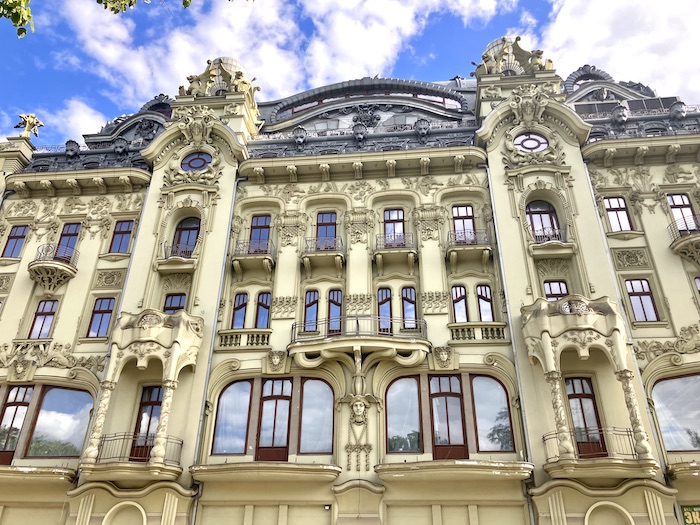
While the UNESCO World Heritage status implies protection, it does not guarantee “a no strike zone.” How effective this clause can be remains to be seen.
In an interview with Euromaidan Press, Mayor Hennadiy Trukhanov confirmed that
“the threat is real because the aggressor state is known for its non-compliance with the rules, for striving to achieve military goals by any means, including destroying the civilian population and cities.”
Yet, the inclusion of Odesa on the World Heritage List will have tangible consequences. If UNESCO-protected sites get damaged during hostilities, the damages are assessed and the estimate and evidence package are forwarded to an international court. The aggressor is obliged to compensate the state that sustained the loss for the damages.
This, said Serhiy Nazarov, adviser to Odesa Mayor, might put pressure on the Russian Federation. He added that inclusion in the UNESCO heritage will boost tourism and the local economy.
The status also comes with certain obligations, such as, according to the Odesa news outlet Vgorode.ua:
- a ban on the appearance of disharmonious objects in the city center;
- maintaining the territory in proper condition (funds for this should be allocated from the local or state or municipal budget);
- preservation of the appearance of the streets as close as possible to such of 1917.
According to Nazarov, this clause is beneficial for preserving the historic center, and protecting it from unscrupulous developers.
https://twitter.com/EuromaidanPress/status/1571254713638600704
This ban only pertains to a certain part of the city’s historic downtown. Odesa residents will not lose the right to decide the fate of the objects and sites that are not considered monuments of national interest.
Monument to Catherine II: should it stay or should it go?
Lately, the monument to Catherine II, a Russian Empress who was considered the city founder by the Soviet history textbooks, is at the center of a heated discussion. A part of the city population considers it a reminder of the imperial past and wants it gone. Others want architectural integrity and insist that the sculpture should stay.
https://twitter.com/ZarinaZabrisky/status/1569813363647213569
"It is not an architectural monument of either local or national importance,” explained Mr. Trukhanov. “This monument is not under UNESCO protection.
The status of World Heritage protects Odesa's multiculturalism, the cultural diversity of our city, and the unique construction plan of the city. It will protect buildings and those objects and sites that are recognized as national monuments. The monument in question is not one of them and therefore the UNESCO protection will not apply to it. Also, notably, the monument is not to Catherine II per se: it is commemorating 'the founders of the city'.”
The first monument to Catherine II was erected in 1900, but it was demolished after Soviet rule was established in the city.
Oleksandr Babich, a historian, an author, and a member of the toponymic committee of the City Council, the body responsible for the installation and removal of the monuments and renaming of the streets, told Euromaidan Press that the issue of renaming the streets and removal of monuments is multi-layered and complex.
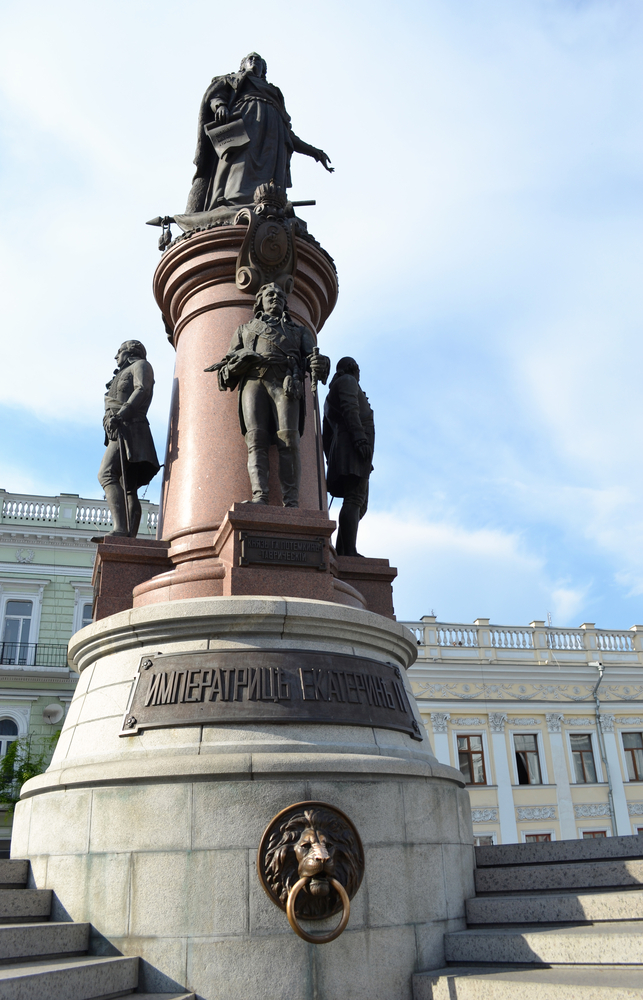
“At the time of the full-scale invasion of the Russian Federation, the process of de-communization was 95% complete. After we have complied with the law on de-communization, the only 'communist' things that remain are the elements on the friezes of the buildings that cannot be easily removed. The streets named after the Soviet bureaucrats in charge of Holodomor were all renamed.
Today, we are talking about de-russification, de-imperialization, and it’s more complicated.
Take the monument to Catherine II, a beautiful monument, aesthetically speaking, and a rich material for tour guides: a lot to be told about the location, the composition and the historic figures depicted [Catherine’s favorites and state officials are a part of the group].
At some point, before the Bolshevik revolution of 1917, this square won a European competition and was considered one of the most beautiful squares in Europe. As a local historian, I would be sorry to see it gone and the city landscape changed.
Also, if we get rid of the monument, what do we do with the name of the square? It is called 'Kateryninska Ploshcha.' We can rename it to 'Ploshcha Nezalezhnosti [Independence Square],' but then we will have to rename one of the main city streets, Kateryninska.
Previously. It went through several names: Ekaterininskaya street, Karl Marx’s street, Hitler street, back to Karl Marx, Kateryninska. Which one should we pick to reflect history?
Also, parallel to this street runs Rishelievska street. Richelieu was a Tsar’s governor-general, an imperialist, you may say, and the street should be renamed. (It was renamed once before, to Lenin street.) We will then have to take down the symbol of Odesa, the monument to Duc de Richelieu. Vorontsov lane, the monument to Vorontsov, another governor-general and imperialist, should be renamed and removed. The Vorontsov Palace should be demolished. We are now looking at renaming Derybasovska, the heart of Odesa, at demolishing bridges and buildings.
How do we change the city space, and the city landscape? I don’t have an answer. I asked Slava Vakarchuk, a Ukrainian rock star, who just returned from Kharkiv, to comment. ‘If you were there, you wouldn’t be thinking any of this. You’d grab a hammer and would be running towards the monument to take it down,’ he said. The Mayor of Kharkiv, who only a year ago was against the demolishing of a monument to the Soviet Marshal Zhukov, drove a heavy truck to the site to help take it down recently. Kharkiv is being shelled daily and parts of the city are in ruins. So, it is a matter of social need and readiness for radical de-imperialization. What are our options? What should we do? Historians, local scholars, the public should be deciding this.”
Pushkin monuments disappear from Ukrainian streets following Lenin, as decolonization is underway
The fact that she is referred to as the founder of Odesa is no more than "Russian imperial propaganda," writes the Ukrainian historical portal Istorychna Pravda: it would mean kicking off the history of the region from the moment it was occupied by Russian troops, kicking out centuries of Greek, Scythian, Crimean Tatar, Cossack, Osman history.
The 18th century is also known as the time when Ukraine ultimately lost the remains of its statehood.
In 1775, Catherine II issued the edict "On the eradication of Zaporizhzhia Sich," destroying the militarized proto-state of the Zaporizhzhia Cossacks a little over a century after the Cossacks pledged allegiance
to the Russian Tsar amid their uprising against the Polish-Lithuanian Commonwealth. Seen as part of the Tsarist destruction of Ukrainian statehood, it predated two centuries of Russia's destruction of Ukrainian nationhood both in the Russian empire and the USSR.
In the same year, she introduced serfdom in Ukraine, essentially enslaving millions of Ukrainan peasants in the Russian empire.
Because of Catherine II's anti-Ukrainian imperial legacy, the monument has been at the center of controversy which has escalated with Russia's full-blown 2022 invasion. The monument is regularly paint-bombed red.
Meanwhile, a group of local lawmakers are calling to transfer the monument to the local history museum.
“Many people do not study history and just fanatically protect the familiar, the old beliefs, habits. Many just love the past, and are nostalgic. [Russian poet] Pushkin only lived in Odesa for thirteen months and so much in Odesa is about Pushkin. Why don’t we have museums and monuments dedicated to Ukrainian writers?” said Olha K., a tourist guide from Odesa, in an interview with Euromaidan Press.
The fate of the monument to the founders of the city also known as the monument to Catherine II will be decided by the Odesa residents at a month-long public hearing that started on September 19.
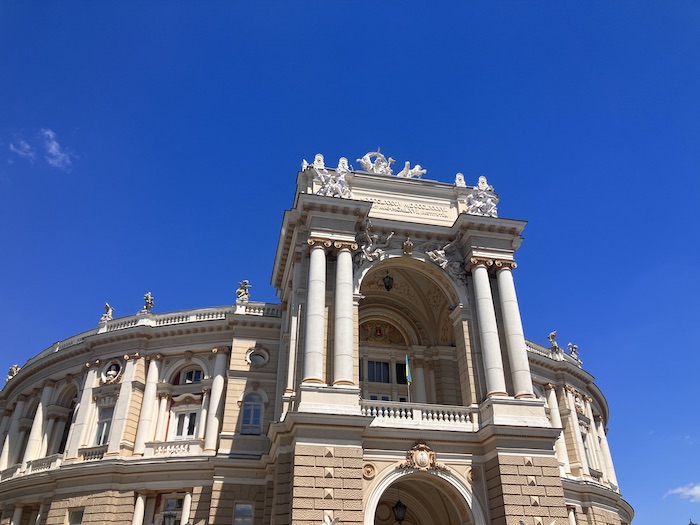
Addressing the past, rethinking history
“It is necessary to rethink history. We must look at Odesa’s history in an unbiased, objective way," said Odesa Mayor Hennady Trukhanov in an interview after the meeting at the City Council.
"The imperial, colonial, post-Soviet period should be studied. We have gathered major scholars and local historians, and I am glad that we have the same opinion on many issues, including the fate of Catherine II.
We are looking at establishing a museum of the post-Soviet, imperial period. Each country has gone through similar periods—perhaps, not every country, but the countries that were a part of the USSR. In the history of any state, there are periods that may not be remembered, yet, they were [there.] Our country, our city, experienced such periods as well.
Today, after the invasion of the Russian Federation, the attitude towards everything Russian has changed dramatically. Nevertheless, this period is a part of the history of our country. And today, we must rethink our attitude towards it, and we will do it.
But then again, there are different ways of doing it. You can barbarously destroy everything and then we will be no better than barbarians. Alternatively, we can rethink it, reconsider, make decisions, explain what and why we are doing, and do it in a civilized way. I am a supporter of the second way: civilized rethinking and decision-making.”
“We can take a look at the history of the aggressor country [Russia]. At a certain period in time, they demolished and destroyed [the old], and then dictated new rules, history, and values. And we see how their country is ending up now: an absolute dictatorship, pro-fascist and Nazi slogans and behavior. A wrong path—rewriting or imposing history—can lead to failure.
I would not want us to end up like this. I am sure that it will not happen to us. We will make the right choices and balanced decisions, and will continue to develop as a cultural, democratic, European country.”
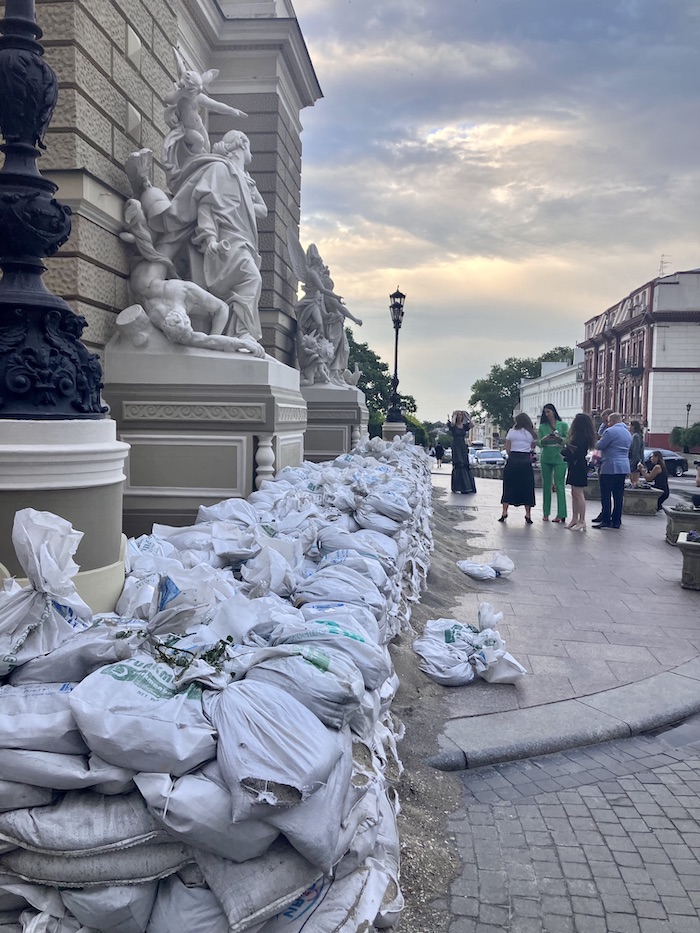
UNESCO helps restore Odesa after Russian aggression
Since the beginning of the war, UNESCO provided $7 million in assistance to Ukraine, in form of grants and assistance on the ground.
In Odesa, UNESCO is funding the repair of the damage inflicted on the Odesa Museum of Fine Arts and the Odesa Museum of Modern Art since the beginning of the war and finances the hiring of additional staff necessary to protect collections.
In addition, the organization supports the digitization of at least 1,000 works of art in Odesa as well as the documentary collection of the Odesa State Archives and supplies new equipment to the Odesa Regional Administration for the protection and recovery of public monuments and sculptures.
Related:
- Making Russia answer for destroying cultural heritage in Ukraine
- Demolishing monuments not enough to destroy post-Soviet nostalgia, but property rights help | 30 Years of Freedom, p.1
- Pushkin monuments disappear from Ukrainian streets following Lenin, as decolonization is underway

